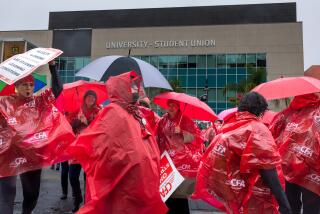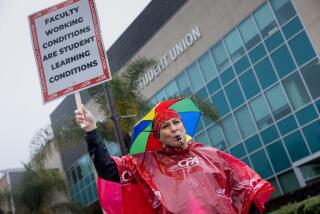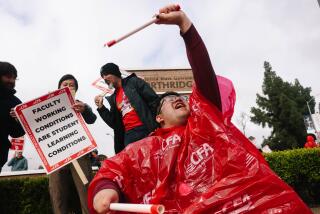Pasadena City College president to get $400,000 in retirement deal
After a rocky four-year tenure, the president of Pasadena City College will get more than $400,000 as part of his retirement settlement, according to documents released Thursday.
College officials initially denied that Rocha was receiving financial incentives as part of his departure, but school leaders agreed to pay him 18 months of salary and some of his potential legal fees.
During his time at Pasadena City College, some faculty and students criticized Rocha for his management style and for approving the cancellation of a winter session. Tensions at the 26,000-student school were so high that a team of advisors visited the campus and told the administration and faculty that they needed to “find a way to move forward.”
Faculty leaders had taken two votes expressing no confidence in Rocha and were considering a third before the college announced his plans to step down from his nearly $250,000-a-year job at the end of August.
The college had also declined to disclose details about Rocha’s severance package. But after The Times and other media organizations filed formal requests for the agreement, college administrators released the documents. They declined to say, however, when the severance package was approved and which, if any, trustees voted to approve it.
Rocha was also able to help prepare the news release announcing his retirement and received a letter of recommendation from Anthony Fellow, president of the college’s board of trustees.
His resignation becomes effective Aug. 31, but his last official working day was July 31, according to the contract. Rocha did not respond to a message left on his cellphone.
Rocha signed the agreement Aug. 4, three days before his retirement was announced. Fellow signed the agreement Aug. 7. No other trustees signed the document.
An attorney for the college declined a public records request from The Times seeking the date and result of any vote approving the settlement, writing that those records “to the extent they exist are protected by the attorney-client privilege.”
However, Terry Francke, general counsel for the open-government group Californians Aware, said “votes and agreements are public.”
For education-related news, follow the reporter on Twitter: @latjasonsong
More to Read
Start your day right
Sign up for Essential California for news, features and recommendations from the L.A. Times and beyond in your inbox six days a week.
You may occasionally receive promotional content from the Los Angeles Times.







